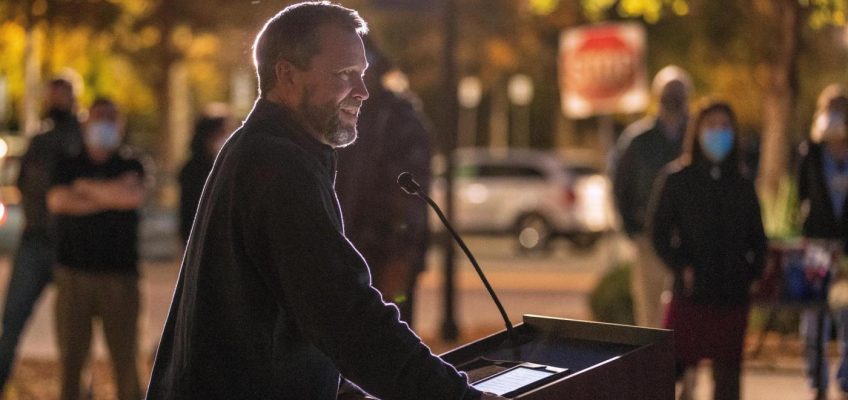By JOSH BOAK, LINLEY SANDERS and AMELIA THOMSON-DEVEAUX, Associated Press
WASHINGTON (AP) — Economic worries were the dominant concern as voters cast ballots for Tuesday’s elections, according to preliminary findings from the AP Voter Poll.
The results of the expansive survey of more than 17,000 voters in New Jersey, Virginia, California and New York City suggested the public was troubled by an economy that seems trapped by higher prices and fewer job opportunities.
And a year after President Donald Trump was brought back to the White House on the promise that he could tame inflation and unleash growth, economic worries were still at the top of voters’ minds. Despite a rising stock market, inflation remains elevated, and hiring has slowed sharply. Since October, a federal government shutdown has only compounded the sense of uncertainty.
While Trump has tried to highlight his efforts to deport immigrants in the country illegally and send federal officers and National Guard troops into cities to fight crime, few voters saw these issues as the top concern for the places they live.
These broader economic anxieties were accompanied by high discontent in some of the off-year elections. More than half of voters in New Jersey and Virginia said they were “angry” or “dissatisfied” with how things were going in the country.
The economic challenges have played out in different ways at the local level. Most New Jersey voters said property taxes were a “major problem,” while most New York City voters said this about the cost of housing. Most Virginia voters said they’ve felt at least some impact from the recent federal government cuts.
Trump administration and private investors sign off on $1.4 billion deal with rare earth startups
FACT FOCUS: New York City ballots do not show proof of election fraud
FBI fires additional agents who participated in investigating Trump, AP sources say
Trump has been silent about Dick Cheney’s death. But on the campaign trail, he railed against him
What to know about Dick Cheney’s heart trouble and eventual transplant
Most voters said they aren’t getting ahead financially
Voters mostly said their own finances were stable, but the poll results suggested that many feel they cannot get ahead in the current economy. That leaves them feeling stuck in place, instead of moving up the financial ladder.
About 6 in 10 voters in New Jersey, Virginia and New York City said their family’s finances were “holding steady,” but relatively few felt they were “getting ahead,” and about one-quarter said they were “falling behind.”
About half of Virginia voters, who were deciding between Democrat Abigail Spanberger and Republican Winsome Earle-Sears for governor, said the economy was the most important issue facing their state. Just 2 in 10 pointed to health care, about 1 in 10 named education or immigration, and fewer than that said crime was the top issue facing the commonwealth.
Most New Jersey voters, who were choosing between Republican Jack Ciattarelli and Democrat Mikie Sherrill for governor, said either taxes or the economy were the top issue in their state. About one-third of voters named each of these issues, compared to about 2 in 10 who said this about health care. Less than 1 in 10 identified immigration or crime as top issues.
Just over half of New York City voters said the cost of living was the most important issue in the city — as the expense of rent and level of income inequality has climbed in America’s most populated city. Democratic mayoral nominee Zohran Mamdani is running against Andrew Cuomo, the former New York governor, and Republican Curtis Sliwa. About one-quarter said crime was their major concern. Another 1 in 10 said this of immigration, and less than 1 in 10 pointed to health care or transportation as the top issue.
Dissatisfaction with direction of the country
The polling found a high level of discontent about America’s direction as a country in several states, a sign that few voters have felt reassured so far by Trump’s return to the White House.
Democratic-led California asked its residents to vote Tuesday on a plan to redraw the lines of its congressional districts, after Trump has pushed Republican states such as Texas to amend their district boundaries in hopes of helping GOP candidates in next year’s midterm elections.
About half of California voters described themselves as “angry” about the direction of the country, with another 2 in 10 saying they were “dissatisfied.”
About 6 in 10 voters in Virginia and New Jersey said they are “angry” or “dissatisfied” with the way things are going in the country today. Just one-third said they are “enthusiastic” or “satisfied.”
Federal cuts hit Virginia voters, while New Jersey voters worry about taxes
People are stressed about affordability, but that’s manifesting itself in different ways.
In Virginia, federal government layoffs and funding cuts initiated by the Trump administration seemed to be taking a toll. Roughly 6 in 10 voters said federal government cuts this year affected their family’s finances “a lot” or “a little.” Those economic woes could compound if the ongoing government shutdown persists and federal employees and contractors are forced to go without paychecks.
In New Jersey, property taxes and electricity costs were raising alarms. About 7 in 10 New Jersey voters called property tax rates where they live a “major problem” and about 6 in 10 said that about their utility bills. Sherrill, the Democrat, seized on cost-of-living issues to attack Trump, whereas Ciattarelli has suggested that tax cuts would help to provide relief on inflation.
In New York City, about 7 in 10 voters said the cost of housing where they live was “a major problem,” with renters being especially likely to point to this as an issue. Fewer voters called crime “a major problem” in the city.
The 2025 AP Voter Poll, conducted by SSRS from Oct. 22 – Nov. 4, includes representative samples of registered voters in California (4,490), New Jersey (4,244), New York City (4,304) and Virginia (4,215). The AP Voter Poll combines data collected from validated registered voters online and by telephone, with data collected in-person from election day voters at approximately 30 precincts per state or city, excluding California. Respondents can complete the poll in English or Spanish. The overall margin of sampling error for voters, accounting for design effect, is plus or minus 2.0 percentage points in California, 2.1 percentage points in New Jersey, 2.2 percentage points in New York City, and 2.1 percentage points in Virginia.




